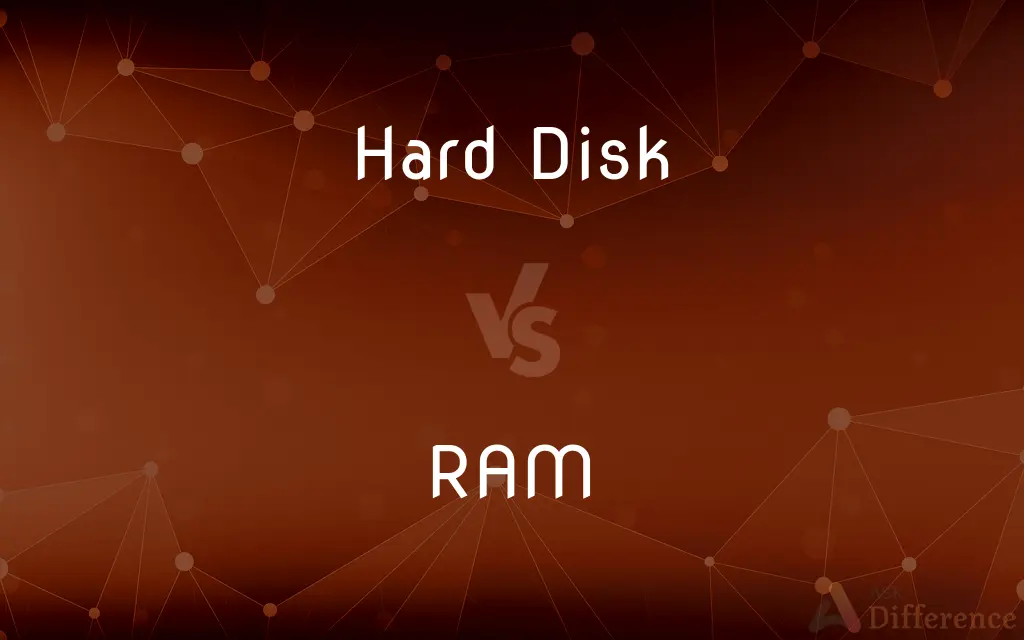Hard Disk vs. RAM — What's the Difference?
By Tayyaba Rehman — Published on November 11, 2023
Hard Disk is a long-term storage device for data, while RAM is a temporary memory that provides quick access for active tasks.

Difference Between Hard Disk and RAM
Table of Contents
ADVERTISEMENT
Key Differences
The Hard Disk serves as the primary storage unit within most computers, storing a vast amount of data including the operating system, applications, and user files. On the other hand, RAM, or Random Access Memory, temporarily holds data that the computer is currently processing, allowing for swift data retrieval and storage.
While Hard Disks have large storage capacities and retain data even when powered off, RAM has a much faster data access speed but is volatile, meaning its content is cleared when the system is turned off. The
Hard Disk often relies on moving parts, such as a spinning disk and read/write head, which can wear out over time. In contrast, RAM uses semiconductor components to store data and does not involve mechanical components, granting it faster access speeds.
The efficient functioning of a computer system requires both the Hard Disk, for long-term storage, and RAM, to ensure smooth and quick operations for the currently active tasks.
Comparison Chart
Primary Function
Long-term data storage
Temporary data storage for active processes
ADVERTISEMENT
Volatility
Non-volatile (retains data after power off)
Volatile (loses data after power off)
Speed
Slower access speeds
Faster access speeds
Components
Contains spinning disks and read/write heads (in HDDs)
Uses semiconductor components
Dependency for Computer Boot
Essential (contains OS and boot files)
Essential for quick data access, but doesn't hold boot files
Compare with Definitions
Hard Disk
Data is retained even after the device is powered off.
Even after shutting down, the files remain saved on the Hard Disk.
RAM
Stands for Random Access Memory, used for temporary data storage.
Having more RAM can speed up your computer.
Hard Disk
A device used for storing vast amounts of digital data.
She stored all her photos and documents on the Hard Disk.
RAM
Is volatile, meaning data is lost when power is turned off.
Any unsaved work in RAM will be lost upon shutting down.
Hard Disk
Often found in computers as the primary storage medium.
The computer's Hard Disk failed, leading to data loss.
RAM
Essential for multitasking and running applications smoothly.
Upgrading the RAM improved the software's performance.
Hard Disk
Can be internal (inside the computer) or external (connected via ports).
He bought an external Hard Disk to back up his files.
RAM
Provides fast access to stored data for the CPU.
The CPU fetches data from RAM during processing tasks.
Hard Disk
Relies on either mechanical components or flash memory.
Traditional Hard Disks have spinning platters and moving heads.
RAM
Common types include DRAM and SRAM.
Most computers use DRAM for their main RAM.
RAM
Digital memory hardware in which information can be accessed in any order with equal speed.
RAM
A male sheep.
RAM
A battering ram.
RAM
The weight that drops in a pile driver or steam hammer.
RAM
The plunger or piston of a force pump or hydraulic press.
RAM
A hydraulic ram.
RAM
A projection on the prow of a warship, used to batter or cut into enemy vessels.
RAM
A ship having such a projection.
RAM
Ram See Aries.
RAM
To strike or drive against with a heavy impact; butt
Rammed the door with a sledgehammer until it broke open.
RAM
To force or press into place.
RAM
To cram; stuff
Rammed the clothes into the suitcase.
RAM
To force passage or acceptance of
Rammed the project through the city council despite local opposition.
RAM
A male sheep, typically uncastrated.
RAM
A battering ram; a heavy object used for breaking through doors.
RAM
A warship intended to sink other ships by ramming them.
RAM
A reinforced section of the bow of a warship, intended to be used for ramming other ships.
RAM
A piston powered by hydraulic pressure.
RAM
An act of ramming.
RAM
A weight which strikes a blow, in a ramming device such as a pile driver, steam hammer, or stamp mill.
RAM
(ambitransitive) To collide with (an object), usually with the intention of damaging it or disabling its function.
The man, driving an SUV, then rammed the gate, according to police.
[http://www.thestar.com.my/news/nation/2016/12/29/snatch-thieves-rammed-by-victim-accidentally/ Two snatch thieves who snatched a woman's bag experienced swift karma when their victim accidentally rammed into their motorcycle.]
RAM
(transitive) To strike (something) hard, especially with an implement.
To build a sturdy fence, you have to ram the posts deep into the ground.
RAM
(transitive) To seat a cartridge, projectile, or propellant charge in the breech of a firearm by pushing or striking.
After placing the cartridge in the musket, ram it down securely with the ramrod.
RAM
(transitive) To fill or compact by pounding or driving.
Rammed earth walls
RAM
(slang) To thrust during sexual intercourse.
RAM
(Northern England) rancid; offensive in smell or taste.
RAM
The male of the sheep and allied animals. In some parts of England a ram is called a tup.
RAM
Aries, the sign of the zodiac which the sun enters about the 21st of March.
RAM
An engine of war used for butting or battering.
RAM
A hydraulic ram. See under Hydraulic.
RAM
The weight which strikes the blow, in a pile driver, steam hammer, stamp mill, or the like.
RAM
The plunger of a hydraulic press.
RAM
To butt or strike against; to drive a ram against or through; to thrust or drive with violence; to force in; to drive together; to cram; as, to ram an enemy's vessel; to ram piles, cartridges, etc.
[They] rammed me in with foul shirts, and smocks, socks, foul stockings, greasy napkins.
RAM
To fill or compact by pounding or driving.
A ditch . . . was filled with some sound materials, and rammed to make the foundation solid.
RAM
The most common computer memory which can be used by programs to perform necessary tasks while the computer is on; an integrated circuit memory chip allows information to be stored or accessed in any order and all storage locations are equally accessible
RAM
(astrology) a person who is born while the sun is in Aries
RAM
The first sign of the zodiac which the sun enters at the vernal equinox; the sun is in this sign from about March 21 to April 19
RAM
A tool for driving or forcing something by impact
RAM
Uncastrated adult male sheep;
A British term is `tup'
RAM
Strike or drive against with a heavy impact;
Ram the gate with a sledgehammer
Pound on the door
RAM
Force into or from an action or state, either physically or metaphorically;
She rammed her mind into focus
He drives me mad
RAM
Undergo damage or destruction on impact;
The plane crashed into the ocean
The car crashed into the lamp post
RAM
Crowd or pack to capacity;
The theater was jampacked
Common Curiosities
How does RAM differ from Hard Disk in terms of data retention?
RAM is volatile, losing its data when powered off, while Hard Disks retain data.
What is the main purpose of a Hard Disk?
The Hard Disk is used for long-term data storage, including the operating system and user files.
Do both Hard Disk and RAM need power to retain data?
Only RAM needs continuous power to retain data; Hard Disks can hold data without power.
Why might a computer slow down when many applications are open?
The RAM might be fully utilized, causing the system to use the slower Hard Disk as "virtual memory."
Are SSDs a type of Hard Disk?
Yes, SSDs (Solid State Drives) are a type of Hard Disk without moving parts, offering faster speeds.
Can you increase a computer's speed by adding more Hard Disk space?
Not directly; while more Hard Disk space allows for more storage, it's increasing RAM that typically boosts operational speed.
Hard Disk or RAM?
RAM is significantly faster than Hard Disk in terms of data access.
Is it possible to operate a computer without a Hard Disk?
Typically no, as the Hard Disk contains essential files, but some systems can boot from external sources.
Do both Hard Disk and RAM use semiconductor technology?
RAM uses semiconductor technology, while traditional Hard Disks use magnetic storage, but SSDs, a Hard Disk type, use semiconductors.
Why is RAM important for a computer's performance?
RAM allows for swift data retrieval and storage, essential for smooth multitasking and application running.
What happens when RAM is full?
The system begins using the Hard Disk as "virtual memory," which is slower than RAM.
Which component is more prone to physical wear and tear?
Traditional Hard Disks with moving parts are more prone to wear, while RAM and SSDs have no moving parts.
Is it possible to upgrade both Hard Disk and RAM in a computer?
Yes, many computers allow for both Hard Disk and RAM upgrades, but it depends on the specific model.
Is data saved on the Hard Disk safer than that on RAM?
Yes, because data on Hard Disk remains even after shutdown, while RAM's data disappears without power.
Share Your Discovery

Previous Comparison
Lipase vs. Amylase
Next Comparison
Deja vu vs. Jamais vuAuthor Spotlight
Written by
Tayyaba RehmanTayyaba Rehman is a distinguished writer, currently serving as a primary contributor to askdifference.com. As a researcher in semantics and etymology, Tayyaba's passion for the complexity of languages and their distinctions has found a perfect home on the platform. Tayyaba delves into the intricacies of language, distinguishing between commonly confused words and phrases, thereby providing clarity for readers worldwide.












































